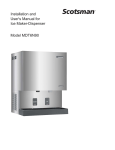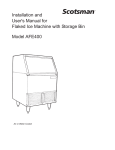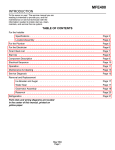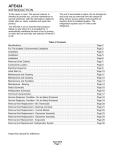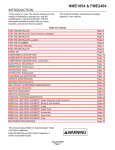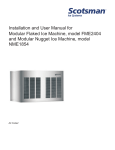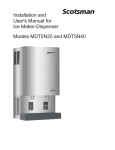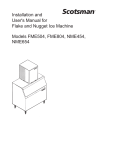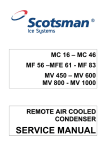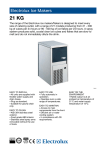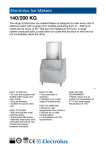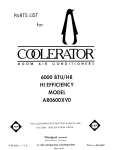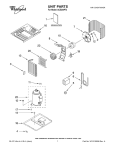Download Flaked and Nugget Ice Machines - Technical Service Information
Transcript
Flaked and Nugget Ice Machines Technical Service Information Table of Contents Introduction . . . . . . . . . . . . . . . . . . . . . . . . . . . . . . . . . . Page 2 Definitions . . . . . . . . . . . . . . . . . . . . . . . . . . . . . . . . . . . Page 3 Suggested Tools . . . . . . . . . . . . . . . . . . . . . . . . . . . . . . . . Page 4 Tubular Discharge Spout . . . . . . . . . . . . . . . . . . . . . . . . . . . Page 5 Auger Removal - AFE325 . . . . . . . . . . . . . . . . . . . . . . . . . . . Page 6 Center Point Breaker . . . . . . . . . . . . . . . . . . . . . . . . . . . . . Page 7 MDT3 and MDT4 Variation . . . . . . . . . . . . . . . . . . . . . . . . . . Page 8 Auger Removal - AFE400, or MDT3, MDT4 . . . . . . . . . . . . . . . . . . Page 9 Auger Removal - MFE400 . . . . . . . . . . . . . . . . . . . . . . . . . . . Page 10 Bearing and Evaporator Service - all 2 inch brass & 1/10 HP . . . . . . . . . Page 11 Water Seal and Bottom Bearing Installation - covers all 2 inch brass types . . Page 12 Extruded Ice Type - Nugget or Flaked Ice . . . . . . . . . . . . . . . . . . . Page 13 Auger Removal . . . . . . . . . . . . . . . . . . . . . . . . . . . . . . . . Page 14 Auger Inspection . . . . . . . . . . . . . . . . . . . . . . . . . . . . . . . . Page 15 Evaporator Inspection . . . . . . . . . . . . . . . . . . . . . . . . . . . . . Page 16 Bearing Service . . . . . . . . . . . . . . . . . . . . . . . . . . . . . . . . Page 17 Water Seal Installation . . . . . . . . . . . . . . . . . . . . . . . . . . . . Page 18 Addendum - New Bearing Design May 2010 . . . . . . . . . . . . . . . . . Page 19 Introduction Scotsman has been manufacturing flaked ice machines since the early 1950s and nugget ice machines since the early 1980s. Although there have been significant changes in drive systems, bearings, materials and refrigeration, the basic flaker remains a vertical refrigerated cylinder containing water and a slowly rotating auger. As the auger rotates it pushes soft, water laden crystalline ice to the outlet, where it is either extruded or compressed into nugget or flaked ice. This booklet contains the technical information to service all current and recent flaked or nugget ice machines. Older, long obsolete models are not included. Current Flaker System Designs Model Type Evaporator Evaporator Wall Auger Motor Nominal Material HP Diameter Metering device Breaker AFE325 Brass 2 inch 1/10 Cap tube Flat bearing retainer, ice discharge tube AFE400 or AFE424 Brass 2 inch 1/10 TXV Center point breaker/bearing retainer Prodigy Flaker or Nugget Ice Machine, NME or FME Stainless steel 3 inch 1/4 TXV Extrusion - 16 holes or 6 slots The booklet's procedures are divided by platform type: • AFE325 and prior • MFE400, MDT3, MDT4, AFE400, AFE424 and prior. AFE424 new in 2010. MDT3 and MDT4 received updated bearings in May 2010. • Prodigy Flakers, Prodigy Nugget Ice Machines, NME, FME, NSE, MDT5, MDT6 and prior Page 2 Definitions Breaker: The top bearing retainer that causes the soft ice to be compressed. Auger: Stainless steel shaft with one or two spiral flights on it. Forces the flaked ice up the walls of the evaporator. Double-Flight Auger: Has two spirals to lift ice, 180 degrees from each other. Rifling: grooves machined into the inside walls of the evaporator. Helps to guide the ice vertically. Water seal: A two piece seal, one rotating one stationary. The rotating part moves with the auger. Evaporator: Refrigerated tube of either stainless steel or brass, surrounded by a continuous copper tube that contains the refrigerant. Also known as worm tube or freezer. Direct drive: Refers to the gear reducer with the motor rotor directly engaging gears. Bearing retainer: Contains the bearing used to support the auger. General Flaked or Nugget Ice Machine Cleaning Instructions see specific model's manual for complete instructions Mineral scale on the auger and evaporator walls will reduce ice making efficiency and add extra load to the auger drive system. Regular cleaning with ice machine cleaner will reduce that load and improve ice output. 1. Switch the ice machine off. 2. Shut off the water to the evaporator. 3. Drain the reservoir and evaporator. 4. Mix 8 ounces of ice machine cleaner with 3 quarts of potable water. 5. Pour the cleaning solution into the reservoir until it is full. 6. Soak the machine with cleaner solution for 15 minutes. 7. Switch the ice machine on and pour the remainder of the cleaning solution into the reservoir until it is all used. 8. Open the water valve and let fresh water into the ice machine. 9. Discard any ice that was made during cleaning. Page 3 Suggested Tools Pullers: • 2 or 3 jaw puller – use for couplings & bearings • Slide hammer puller – use to pull augers Adapters to fit augers: • • • • Small brass flakers – 7/16 -14 Large brass flakers – ½ - 20 Nugget - 5/8 – 18 MDT2 - 7/16 -14 Slide Hammer with tips Breaker removal • 1/8" wire chain cut to grab cap on small brass flakers. Not applicable to AFE424 or updated bearing units. Wrenches: • ½” gear drive ratchet for adapter & freezer bolts Small Length of Chain Misc: • Snap ring pliers • Corbin clamp pliers 1/2" Gear Drive Wrench 3-jaw puller Corbin Hose Clamp Pliers Page 4 Snap Ring Pliers Tubular Discharge Spout Models Covered: AFE325 The main characteristic of the AF or prior MF system is the tubular discharge spout and mushroom-topped auger. Ice is made in the normal way, but at the top of the evaporator, the soft ice forced into a small area formed between the mushroom top and the evaporator wall which compresses it into a dryer form. Then, as the auger turns, the compressed ice is collected by the spout casting that is attached to the side of the evaporator. The collected ice flows through a movable tube to the bin. A spout safety switch is attached to the side of the tube, so if the tube becomes restricted with ice, the tube is pushed away from the auger, tripping the switch and shutting the machine off. Mushroom Auger Top Bearing Ice Outlet Area Refrigeration Tubing Water Inlet Tube Water Seal Bottom Bearing AFE325 Evaporator Schematic Page 5 Auger Removal - AFE325 1. Disconnect electrical power. 2. Shut off water supply and drain reservoir and evaporator. 3. Pull up on black rubber cap and remove it. 4. Remove two allen head screws holding spout assembly to evaporator and disconnect spout from evaporator. Allen Head Screw Retaining Screw Spout Removal 5. Remove one screw holding top bearing retainer to evaporator. It is holding the spout mounting plate to the evaporator. 6. Pull up on cap hook to remove auger. If more force is required, use a 12 inch length of 1/8" chain, with each end cut into a hook. Remove the cap hook and insert the chain into the holes. Insert a wrench or hammer through the chain and pull up to pull out the auger. Cap Hook Spout Top View, Spout Removal Another method is to use a slide hammer puller. To use, use a snap ring pliers to remove the cap hook and the cap. Remove the bolt at the top of the auger. Thread the slide hammer into the auger, and use the slide to remove the auger. Using Chain Using Slide Hammer Page 6 Center Point Breaker Models Covered: AFE400, MDT3, MDT4, MFE400 and many prior In this type of flaker, ice is made in the usual way but at the top of the evaporator there is a brass bearing retainer. This bearing retainer is shaped with a tapered base facing the auger that slopes upward to the ice discharge spout. The tapered base has two slopes with a point in between, so two streams of ice are formed as ice is forced against it. As ice is made it is pushed up the evaporator by the auger. At the top of the auger the ice is compressed against the tapered base of the bearing retainer. This squeezes much of the water out of the ice and forces the compressed ice into the ice discharge spout. Center Point Breaker Top Bearing Ice Breaker / Bearing Retainer Ice Outlet Area Auger Coupling AFE400 Evaporator Schematic Page 7 MDT3 and MDT4 Variation The MDT3 and MDT4 evaporators are very similar to the AFE400, but there are differences. They include: • • • • Double-flight auger - use began June 2005 Two-row ball top bearing Longer evaporator and auger Capillary tube metering device The MFE400 also has the two-row top bearing and longer evaporator but it does not have the double flight auger. Top Bearing Spout Ice Outlet Area Double-flight or two spiral auger MDT4 Evaporator Schematic Page 8 Auger Removal - AFE400, or MDT3, MDT4 1. Disconnect electrical power. 2. Shut off water supply and drain reservoir and evaporator. 3. Remove necessary panels to get access to the side of the evaporator opposite the spout. 4. Remove two permagum plugs from evaporator side. Remove Permagum 5. Remove the two phillips head screws located under the the permagum. 6. Pull up on cap hook to remove auger. If more force is required, use a 12 inch length of 1/8" chain, with each end cut into a hook. Remove the cap hook and insert the chain into the holes. Insert a wrench or hammer through the chain and pull up to pull out the auger. Note: Bearing enclosure changed in 2007 and top bearing changed May 2010. Both have a plastic cap and the cap hook or chain method will not apply. An inch and a half Tee can be attached and use for pulling. Remove Two Screws Revised Design Another method is to use a slide hammer puller. To use, use a snap ring pliers to remove the cap hook and the cap. Connect Chain - Prior to May 2010 Remove the bolt at the top of the auger. Thread the slide hammer into the auger, and use the slide to remove the auger. Attach Slide Hammer Page 9 Auger Removal - MFE400 1. Disconnect electrical power. Foam Cap 2. Shut off water supply and drain reservoir and evaporator. 3. Remove necessary panels to get access to the side of the evaporator opposite the spout. 4. Remove styrofoam cap. 5. Remove two screws from the side of the evaporator. 6. Pull up on cap hook to remove auger. If more force is required, use a 12 inch length of 1/8" chain, with each end cut into a hook. Remove the cap hook and insert the chain into the holes. Insert a wrench or hammer through the chain and pull up to pull out the auger. Back View of MFE400 Another method is to use a slide hammer puller. To use, use a snap ring pliers to remove the cap hook and the cap. Remove the bolt at the top of the auger. Thread the slide hammer into the auger, and use the slide to remove the auger. Remove Two Screws Page 10 Pull Auger Up and Out Bearing and Evaporator Service - all 2 inch brass & 1/10 HP After the auger has been removed, the bottom half of the water seal and the bottom bearing will still be in the bottom of the evaporator. To remove them: 1. Remove the evaporator from the adapter stand. 2. Push or tap down on the water seal to remove both parts. Note: Always replace BOTH bearings AND the water seal when replacing either part. Ball bearing type: The top bearing can be removed by a press if the bearing is intact. If the inner race slips out of the bearing, the entire bearing retainer/breaker with a new bearing must be installed. Note: The bearing cannot be greased in the field. Overfilling with grease will cause bearing failure. Roller bearing type: The bearing can be replaced. See page 19. Coupling Removal The coupling that connects the auger splines to the output shaft of the gear reducer usually stays on the gear reducer when the auger is removed. The splines are pre-lubricated at the factory and can also be lubricated in the field using the grease fitting on the side. Occasionally the coupling will stick to the output shaft and resist removal. In those cases use of a two or three jaw puller is recommended to remove the coupling. Evaporator Inspection The brass evaporator shouldn't need to be replaced unless the auger has come into contact with the inside wall. The inside wall contains vertical grooves or rifling that can be used as a guide to determine if the evaporator can be salvaged. Shallow marks from the auger can be honed and sanded out. However, if the auger has gouged the evaporator wall as deep as the vertical groove, the evaporator should be replaced. Evaporator Service The brass evaporator can be honed using an automotive cylinder hone, followed by vertical sanding to remove the honing marks. All marks on the inside of the evaporator wall must be vertical. Page 11 Water Seal and Bottom Bearing Installation - covers all 2 inch brass types 1. Remove old rotating half from the auger. Clean the mounting area. Sealant Here 2. Place a bead of food grade sealant (such as Scotsman part number 19-0529-01) onto the shoulder of the auger where the rotating half of the water seal will be installed. 3. Wash the new seal in water. While wet, slip it onto the bottom of the auger, rubber side toward the auger. Push up until seated against the sealant. Do not allow any sealant to come into contact with the face of the seal. Rubber Side Smooth Side 4. Wash the stationary half the water seal with water. Slip it up into the bottom of the evaporator until the bottom of the seal is inside the evaporator about 1/4". 5. Push the bottom bearing against the water seal until the bottom bearing is inside the evaporator about 1/16". 6. Replace the evaporator on the adapter, and re-attach the stand using the original bolts. 7. Attach the auger to the top bearing and breaker. 8. Return the auger to the evaporator and slide it down until the splines touch the coupling. Note: Pre-align the breaker holes with the evaporator holes to aid in installation. 9. Rotate the auger until the coupling splines align with the auger. 10. Push the auger down, and rotate the breaker until the screw holes line up with the pilot holes in the evaporator. 11. When the auger is completely seated, reinstall the breaker screws and the bearing cap. 12. Replace permagum and foam top. Page 12 Extruded Ice Type - Nugget or Flaked Ice Models Covered: FM, FME, ND, NDE, NM, NME, NS, NSE, MDT5, MDT6 In these models the ice is made in the usual way but at the top of the evaporator it is extruded through vertical holes or slots. The bearing retainer, bolted to the top of the evaporator, has either holes for nugget ice or slots for flaked ice machined into it. As the soft ice is pushed through the holes or slots, it is compressed into either nugget or flaked ice. After the ice is extruded, it is forced to the out side, causing the extruded ice to break off into usable lengths. Top Bearing Breaker / Bearing Retainer Ice Extrusion Holes Ice Outlet Area Refrigerant Tubing Double-flight auger Water Seal NME Type Evaporator Schematic Page 13 Auger Removal 1. Disconnect electrical power. 2. Shut off water supply and drain reservoir and evaporator. 3. Remove necessary panels 4. Remove ice chute cover. 5. Unscrew ice sweep. 6. The auger and breaker/bearing may now be removed as an assembly. a. Unscrew 4 allen head cap screws holding breaker to evaporator. b. Lift up on breaker and remove auger from evaporator. Ice Sweep Removed Note: If the auger is stuck, the breaker must be removed from the auger. The breaker may be removed from the auger and evaporator without disturbing the auger. a. Unscrew breaker cover from breaker (left hand threads) b. Unscrew auger stud from top of auger. Remove allen head cap screws c. Unscrew 4 allen head cap screws holding breaker to evaporator. d. Lift up & remove breaker from evaporator. e. Lift up and remove auger from evaporator. Note: If the auger is stuck use a slide hammer type puller to pull on the auger at the threaded hole. The size of that hole is 5/8"-18. Attach Slide Hammer Page 14 Auger Inspection The auger must be carefully inspected for wear and scale. There are also wear areas like the top bearing surface and the edges of the flights. The edges of the auger have horizontal serrations and highly machined areas in between. If the auger has contacted the evaporator wall, it will have very rough flight edges and should be replaced. Scale forms on the auger during normal ice making. If scale is still on the auger after cleaning in the ice machine, the scale can be removed using ice machine cleaner and a nylon scrub pad. Inspect the auger, the critical areas of the auger are: 1. The auger body. It should be clean and shining. Sometimes an auger will appear clean when wet, but after it is dry it will be seen to be stained. Scrub the auger with ice machine cleaner and hot water. Caution: Ice machine cleaner is an acid. Handle it with extreme care, keep out of the reach of children. Example of a Clean Auger 2. The water seal area. Because the auger has been removed, the water seal will have to be replaced. Remove the water seal top half from the auger, and remove any sealant or debris from the shoulder of the auger where the water seal was. Page 15 Evaporator Inspection The evaporator's inner wall has 12 shallow vertical grooves machined into the stainless steel surface. These grooves provide direction for the ice as it is pushed up the evaporator by the auger. If the grooves are damaged or there are radial marks on the inside of the evaporator, it should be replaced. The stainless steel evaporator cannot be honed, as honing leaves radial marks that cannot be sanded out. Most scale will be removed by ice machine cleaner during the de-scale process. Stubborn scale deposits on the evaporator surface can be sanded, but the sanding motion must be vertical. Example of Scale Build Up on Evaporator Wall Sanding the Evaporator Page 16 Bearing Service Inspect the bearing. There should be plenty of grease in sight. If grease is needed the bearing and breaker should be removed to check the action of the bearing. It should rotate smoothly. Needle If the bearing only needs grease, inject grease into the bearing using Scotsman grease needle pn 02-3559-01 and Scotsman bearing grease cartridge, pn A36808-001. Be sure to inject grease evenly and thoroughly. Adding Grease Using Needle Bearing Replacement The bearing can be replaced if it can be pressed out of the bearing retainer. An arbor press is required to remove the bearing. Whenever the bearing is replaced the two lip seals under the bearing must also be replaced. Lip Seal Replacement Press out the old bearing and pry out the old lip seals. PVC Coupling Place the first new lip seal in the bearing retainer, the U faces up. Use a 2" PVC coupling and place it in the U of the seal. Press the seal into place with the coupling. Repeat for the second seal. After the lip seals have been replaced the new bearing can be pressed into the bearing retainer. The breaker generally does not wear out and need to be replaced unless there has been severe bearing failure. Page 17 Inserting Lip Seal Using PVC Coupling Water Seal Installation To Remove the Water Seal: (Assuming all steps to remove the auger have been performed.) 1. The gearmotor/evaporator assembly will have to be exposed. 2. Remove the 4 hex head cap screws holding the evaporator to the gearmotor assembly. Lift the evaporator up and off of the gearmotor. 3. Remove the wire retainer from the groove under the water seal. 4. Pull or drive out the lower half of the water seal. To Replace the Water Seal: 1. Lubricate the water seal with water, and push the water seal into the bottom of the evaporator slightly past the groove for the snap ring. 2. Replace the snap ring and pull the water seal down against it. 3. The part of the water seal that rotates with the auger must also be replaced. Remove the old part from the auger and clean the mounting area. 4. Place a small bead of food grade silastic sealant (such as 732 RTV or Scotsman part number 19-0529-01) on the area of the auger where the water seal is to be mounted. 5. Carefully push the water seal (rubber side against the auger shoulder and the silastic.) Do not get any sealant onto the face of the seal. 6. Allow the auger and seal to air dry until the silastic is dry on the surface. 7. If the original water seal was leaking, it would be a good idea to inspect the interior of the gearmotor. 8. Assemble auger to breaker, carefully insert auger into evaporator. Rotate to engage gear reducer shaft. Page 18 Addendum - New Bearing Design May 2010 Applies to MDT3, MDT4 and AFE424 The replacement top bearing, breaker and auger for the AFE400/424, MDT3 and MDT4 have been changed. They are significantly different from the prior parts. Two kits have been developed. The AFE400/424 bearing and auger kit is 02-4578-01. The MDT3 & MDT4 bearing and auger kit is 02-4578-02. It also fits MFE400. Each kit is complete with new auger, top and bottom bearings and water seal. Thrust Washer Removal of the auger is the same as on page 9. The top bearing can be replaced. 1. Get access to the top of the evaporator. Roller Bearing Thrust Bearing 2. Remove cap from top of breaker. Top Bearing Construction 3. Loosen but do not remove bolt holding auger to bearing. 4. Remove two phillips head screws from side of breaker. 5. Attach a T (like on page 9) to the top of the breaker. 6. Pull auger up and out of the unit. 7. Remove bolt holding auger to bearing, pull bearing from auger. 8. Remove retaining ring from inside of breaker, just above roller section. Early 2010 parts did not have a retaining ring. 9. Invert breaker and drive old bearing out of breaker. 10. Assemble new bearing. Bearing will be installed in two sections, first the roller section and then the thrust section. Page 19 The roller section must be held together during installation. Suggested method: a) Assemble a 1.75" 5/16 - 18 bolt, 2 flat washers and a 1/2" long piece of 3/4" PVC tubing. The tubing must be cut square. Bottom b) Install parts onto new bearing as shown. c) Drive the bearing into the breaker cavity by lightly tapping on the bolt (the PCV helps to avoid damaging the bearing surface). Remove bolt, spacer and washers when done. Note: Remove the outside o-ring and put the breaker into the evaporator tube to support the breaker while driving in the bearing. Be sure to put the o-ring back onto the outside of the breaker during final assembly. 3/4" PVC Tube Roller Section with Installation Tool Retaining Ring Thrust Section: a) Insert retaining ring (when used) into groove inside breaker. b) Add about 1 oz of grease to thrust bearing and place on top of roller bearing housing. Note: Grease is Mobilith SCHPM460, Scotsman part number 19-0662-02. Roller Section Installed c) Place thrust washer onto top of thrust bearing. d) Install onto auger. e) Install and tighten bolt. f) Attach cap, be sure it is on tight. 11. Install auger into evaporator. Note: New bottom bearing and water seal recommended. Grease and Thrust Bearing Added Page 20 SCOTSMAN 775 Corporate Woods Parkway Vernon Hills, IL 60061 800-533-6006 www.scotsman-ice.com 291-830
























